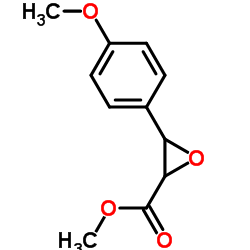Methyl 3-(4-methoxyphenyl)oxirane-2-carboxylate

Methyl 3-(4-methoxyphenyl)oxirane-2-carboxylate structure
|
Common Name | Methyl 3-(4-methoxyphenyl)oxirane-2-carboxylate | ||
|---|---|---|---|---|
| CAS Number | 42245-42-1 | Molecular Weight | 208.211 | |
| Density | 1.2±0.1 g/cm3 | Boiling Point | 297.7±40.0 °C at 760 mmHg | |
| Molecular Formula | C11H12O4 | Melting Point | 69-71ºC(lit.) | |
| MSDS | Chinese USA | Flash Point | 129.2±27.4 °C | |
| Symbol |

GHS07 |
Signal Word | Warning | |
|
Optimization of Serratia marcescens lipase production for enantioselective hydrolysis of 3-phenylglycidic acid ester.
J. Ind. Microbiol. Biotechnol. 31(11) , 525-30, (2004) Lipase production and cell growth of Serratia marcescens ECU1010 were optimized in shake flasks, with lipase production being enhanced 9.5-fold (4,780 U/l) compared with the initial activity (500 U/l). Optimal carbon and nitrogen sources were Tween-80 and pep... |
|
|
A practical procedure for the large-scale preparation of methyl (2R,3S)-3-(4-methoxyphenyl)glycidate, a key intermediate for diltiazem.
J. Org. Chem. 67(13) , 4599-601, (2002) A practical synthesis of methyl (2R,3S)-3-(4-methoxyphenyl)glycidate (-)-2, a key intermediate for diltiazem (1), was developed. Treatment of methyl (E)-4-methoxycinnamate 3 with chiral dioxirane, generated from chiral ketone 4, provided (-)-2 in 77% ee and 8... |
|
|
Highly enantioselective mukaiyama aldol reaction of alpha,alpha-dichloro ketene silyl acetal: an efficient synthesis of a key intermediate for diltiazem.
J. Org. Chem. 68(3) , 974-9, (2003) An efficient synthesis of methyl (2R,3S)-3-(4-methoxyphenyl)glycidate (-)-2, a key intermediate for diltiazem (1), has been developed on the basis of the highly enantioselective Mukaiyama aldol reaction of p-anisaldehyde (4a) with alpha,alpha-dichloro ketene ... |
|
|
Occupational contact dermatitis from trans-methyl-3-(4-methoxyphenyl)glycidate.
Contact Dermatitis 25(4) , 262-3, (1991)
|
|
|
Dermatitis from methyl 2,3 epoxy-3-(4-methoxyphenyl)propionate.
Contact Dermatitis 23(5) , 382, (1990)
|
|
|
Leukocytosis and low serum IgA in workers exposed to the epoxy compound, t-methyl-3-phenylglycidate.
Int. Arch. Occup. Environ. Health 60(1) , 7-14, (1988) Forty-nine out of 54 male workers engaged in the production of an epoxy compound, t-methyl-3-phenylglycidate, showed skin symptoms in varying degrees that may be due to the skin-irritative effect of the compound. The exposed workers were also shown to have su... |